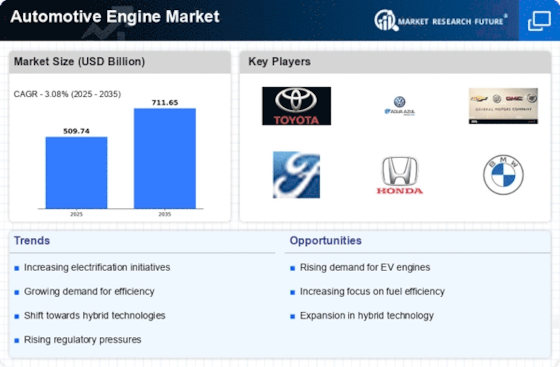Top Industry Leaders in the Automotive Engine Market
*Disclaimer: List of key companies in no particular order
Understanding the trajectory of the market requires a comprehensive grasp of the key players, their strategies, and the emerging trends that shape the automotive engine industry. This knowledge is vital for all stakeholders seeking to navigate the complex dynamics of this rapidly evolving sector.
Dominant Players and Their Strategies:
1. Legacy Giants: Established automakers such as Toyota, Volkswagen, and Ford have secured significant market share through vertically integrated operations, brand recognition, and extensive distribution networks. Their primary focus involves optimizing internal combustion engines (ICEs) for fuel efficiency and emission compliance, alongside substantial investments in hybrid and electric powertrains. Toyota leads in hybrids with its Prius line, while VW aggressively promotes its ID. family of electric vehicles.
2. Tiered Suppliers: Companies like Bosch, Delphi, and Denso specialize in engine components and systems, catering to both OEMs and aftermarket segments. Their competitive advantage lies in technological innovation and cost-effectiveness. Bosch, for instance, excels in fuel injection systems and engine management software, while Delphi focuses on turbochargers and emission control technologies.
3. Emerging Disruptors: New entrants like Tesla and BYD challenge the traditional order with cutting-edge electric vehicle (EV) technology and vertically integrated business models. These companies prioritize rapid innovation, aggressive pricing, and direct-to-consumer sales, attracting a tech-savvy and environmentally conscious customer base. Tesla dominates the premium EV segment, while BYD focuses on affordable electric cars.
Market Share Analysis: Decisive Factors:
1. Geographical Distribution: Demand patterns vary across regions, with North America and Europe emphasizing fuel efficiency and stringent emission regulations, while developing economies like China and India prioritize affordability and vehicle access. Engine manufacturers need localized strategies and product portfolios to address these regional variations.
2. Engine Type: While internal combustion engines (ICEs) still dominate, the rise of hybrids, plug-in hybrids, and battery-electric vehicles (BEVs) is reshaping the landscape. Market share analysis must consider factors like hybrid powertrain efficiency, BEV charging infrastructure, and government incentives for alternative fuels.
3. Cost and Performance: Balancing affordability with engine performance is crucial. Legacy players excel in cost-efficient mass production, while new entrants often offer superior performance at premium prices. A nuanced understanding of these trade-offs is essential for effective market share analysis.
New and Emerging Trends:
1. Electrification: The industry is witnessing a rapid shift towards electrification, marked by significant investments in battery technology, charging infrastructure, and EV production. Companies like CATL and LG Chem lead the charge in battery technology, while global governments offer subsidies and incentives to promote EV adoption.
2. Fuel Cell Technology: Hydrogen fuel cells, offering zero emissions and faster refueling compared to BEVs, are gaining traction in heavy-duty vehicles and commercial fleets. Companies like Toyota and Hyundai are heavily invested in this technology, with Toyota leading the way with its Mirai fuel cell car.
3. Software-Defined Engines: Integration of advanced software and artificial intelligence into engine management systems is optimizing performance, efficiency, and emissions. Pioneers in this field, such as Bosch and Continental, are developing software solutions that enhance fuel economy and predictive maintenance.
Overall Competitive Scenario:
The automotive engine market stands at a crossroads, with traditional ICEs facing increasing pressure from electrification. Legacy players adapt by optimizing ICEs and transitioning to hybrids and BEVs, while new entrants disrupt the market with innovative technologies and direct-to-consumer models. Success in this dynamic landscape hinges on agility, adaptability, and a clear vision for the future of mobility.
Industry Developments and Latest Updates:
1. Cummins Inc.:
- Date: December 19, 2023
- Development: Cummins partners with Daimler Truck North America to develop hydrogen fuel cell powertrains for heavy-duty trucks, aiming to launch the first commercial vehicles in 2025.
2. Fiat S.P.A.:
- Date: October 27, 2023
- Development: Stellantis (Fiat Chrysler Automobiles' parent company) unveils its Dare Forward 2030 strategic plan, aiming for 100% electric car sales in Europe by 2030.
3. Volkswagen Group:
- Date: December 15, 2023
- Development: Volkswagen Group announces plans to invest €86 billion in battery production and charging infrastructure by 2030.
4. Ford Motor Company:
- Date: November 10, 2023
- Development: Ford announces plans to invest $50 billion in electric vehicle development by 2026.
5. Mitsubishi Heavy Industries:
- Date: September 12, 2023
- Development: Mitsubishi Heavy Industries plans to develop a new hybrid powertrain for large trucks that combines a diesel engine with an electric motor.
Top Companies in the Automotive Engine Industry:
- Cummins Inc.
- Fiat S.P.A.
- Volkswagen Group
- Ford Motor Company
- Mitsubishi Heavy Industries
- AB Volvo
- General Motors
- Honda
- Hyundai Motor Company
- Scania AB, and others.










